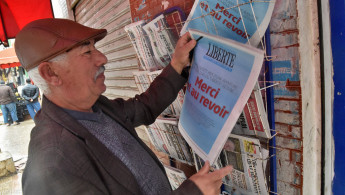As censorship of speech mounts in Algeria, a new controversial journalism law is revealed
The Algerian government has announced a new controversial draft to regulate journalism in the country, as rights groups warn of a deterioration in freedom of speech in the North African state.
Late on Sunday, the Algerian ministerial council discussed a new draft that will oblige printed and online newspapers to declare their funding sources.
If passed, the draft will ban Algerian newspapers and websites from receiving funds from abroad or from "suspicious sources."
The Algerian parliament is expected to vote on the new journalism law in the upcoming weeks.
"The draft is based on the logic of protecting journalists and aims to advance the media sector," said President Abdelmadjid Tebboune during the meeting.
Last week, the National Council of Algerian Journalists voiced dissatisfaction with the government's law after it was excluded from the drafting process.
"The marginalisation is an unjustified paradox and a repetition of old methods that used to exclude independent unions," said the council.
International rights groups have consistently called out the current Algerian regime for targeting journalists and activists and sabotaging the country's path to democracy after pro-reform protests.
Algeria is ranked 134th (out of 180) in the Reporters Without Borders (RSF) 2021 World Press Freedom Index.
Algerian authorities are holding at least 280 activists and dozens of journalists in detention, mostly for defamation of politicians or because of publications on social networks.
In April, the renowned Algerian Francophone newspaper Liberté closed its doors after a long battle against the authorities' censorship.
In addition to the crackdown on freedom of speech, financial hardships in the last twenty years have pushed many titles, such as Le Matin, La Tribune and the weekly La Nation, to close over a drop in advertising revenue and sales.
El-Watan, the most widely printed Francophone newspaper in Algeria, recently released a statement predicting that its closure is only "a question of time" due to rising political pressure and the economic situation it faces.





 Follow the Middle East's top stories in English at The New Arab on Google News
Follow the Middle East's top stories in English at The New Arab on Google News
![The UAE is widely suspected of arming the RSF militia [Getty]](/sites/default/files/styles/image_330x185/public/2024-11/GettyImages-472529908.jpg?h=69f2b9d0&itok=Yauw3YTG)
![Netanyahu furiously denounced the ICC [Getty]](/sites/default/files/styles/image_330x185/public/2024-11/GettyImages-2169352575.jpg?h=199d8c1f&itok=-vRiruf5)
![Both Hamas and the Palestinian Authority welcomed the ICC arrest warrants [Getty]](/sites/default/files/styles/image_330x185/public/2024-11/GettyImages-2178351173.jpg?h=199d8c1f&itok=TV858iVg)